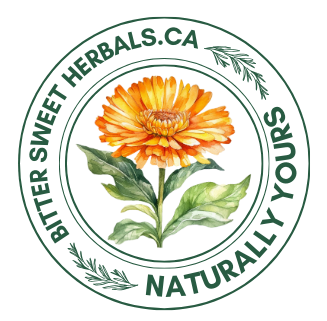A Beginners Guide to herbal wellness for all ages
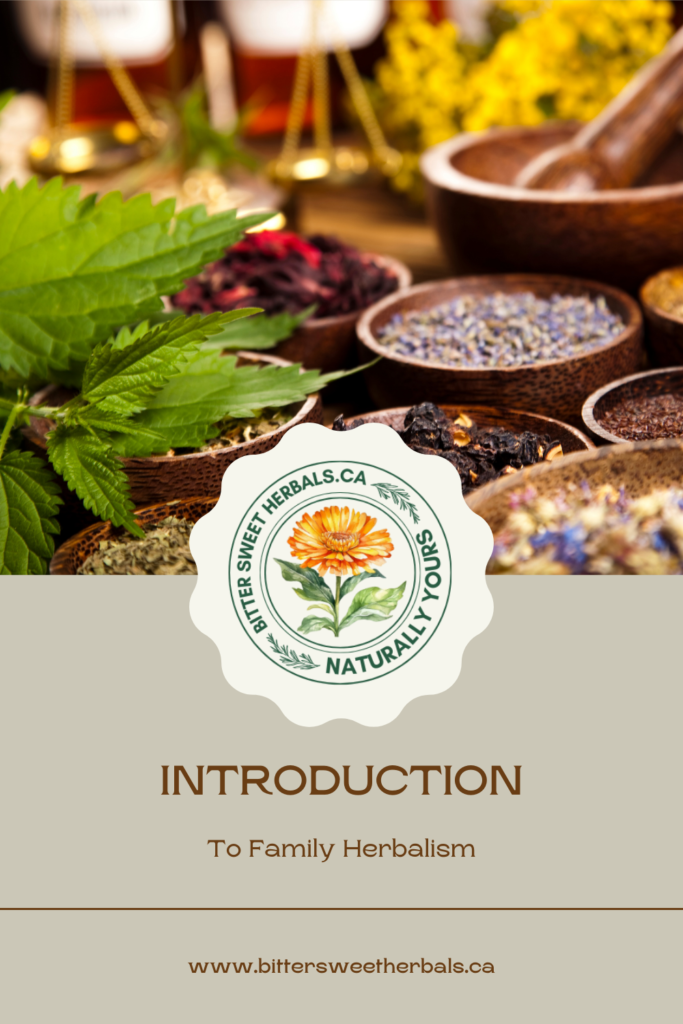
Incorporating herbs into your family’s wellness routine is a powerful way to promote natural healing, build immunity, and foster well-being. As a family herbalist, you’ll learn to tailor remedies for everyone, from toddlers to seniors, ensuring that each family member can benefit from safe and effective herbal care. This short guide will walk you through the basics of becoming a family herbalist, including tips on choosing the right herbs, creating simple remedies, and using herbs for health concerns at every stage of life.
Why Become a Family Herbalist?
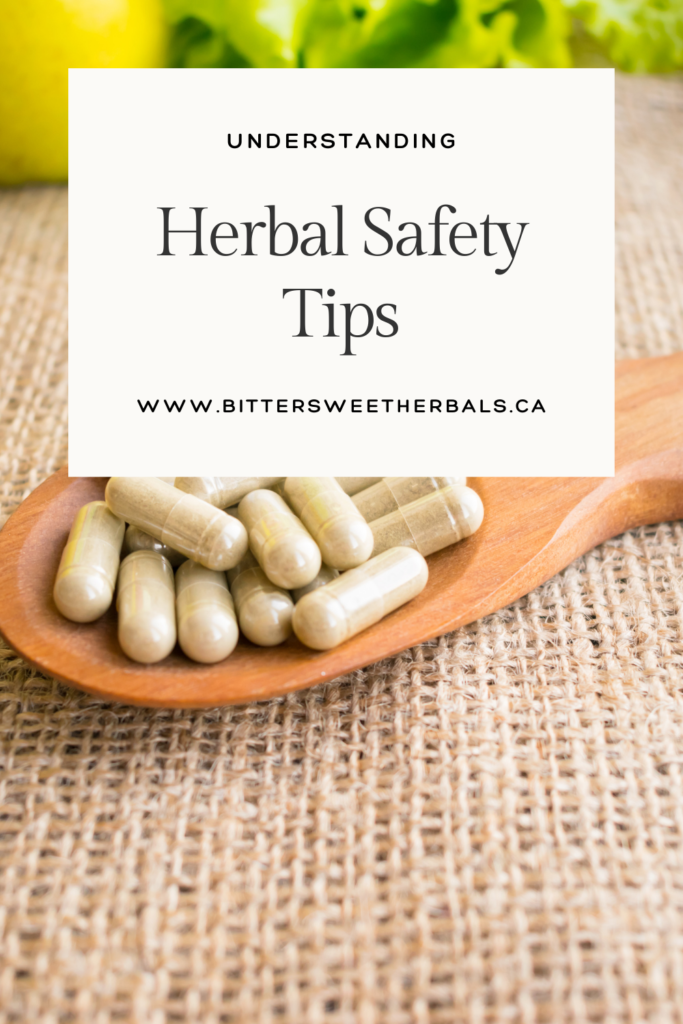
Herbal medicine has been used for centuries to address health issues naturally. Becoming a family herbalist means taking charge of your family’s health with time-tested, plant-based remedies. Herbs offer gentle, effective solutions for everyday ailments such as colds, digestive issues, anxiety, and even chronic conditions. Best of all, herbs can be customized to suit each family member’s unique needs, whether you’re caring for young children, adults, or aging parents.
Getting Started: Your Herbal Basics
To begin your journey as a family herbalist, start by familiarizing yourself with a few basic, gentle herbs that are safe for all ages. These herbs are versatile and can be used in teas, tinctures, salves, and more. As you grow more confident, you can expand your herbal repertoire to address specific health concerns.
Essential Herbs for the Family Herbalist
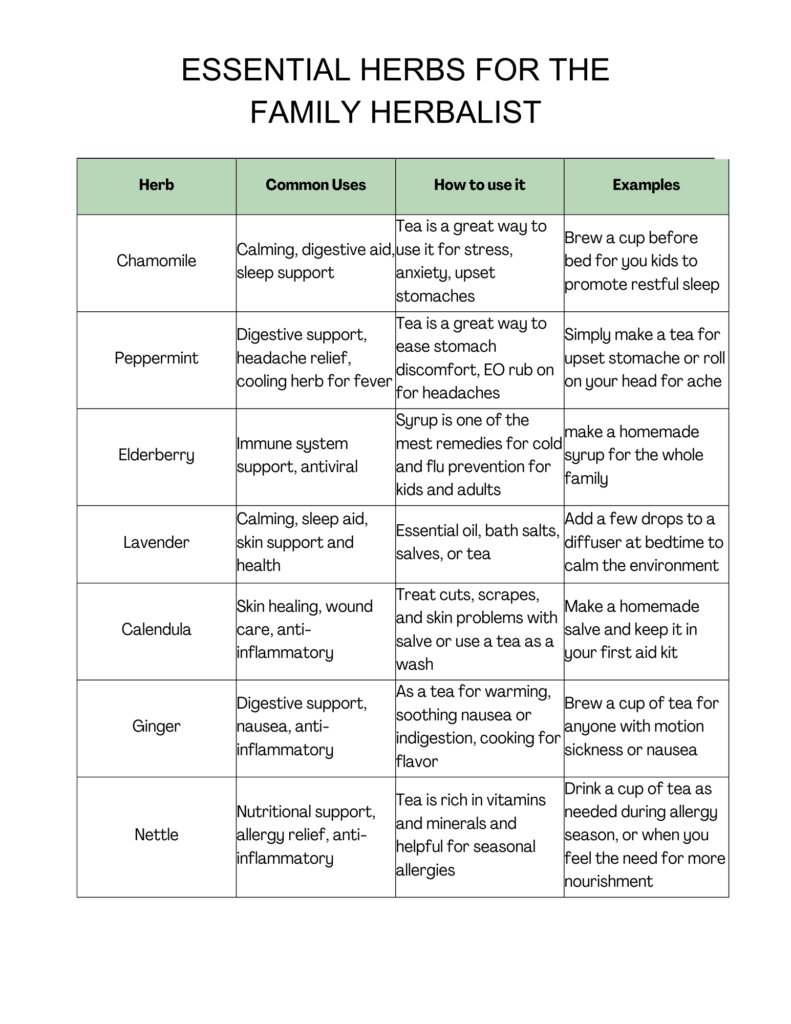
Tailoring Herbal Remedies for Different Ages
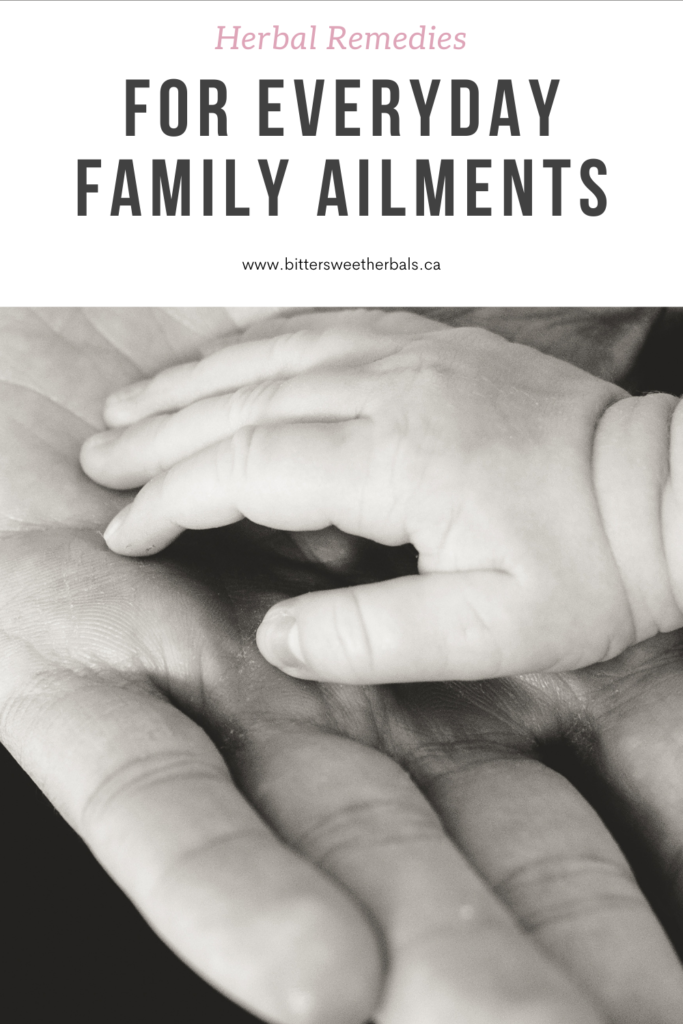
Every stage of life comes with its own unique health needs, and herbs can be used to support the entire family—from toddlers to seniors.
Here are some tips on how to tailor herbal remedies for different family members.
Herbs for Toddlers (1-3 Years)
When using herbs with toddlers, focus on gentle, safe remedies that are free from alcohol and strong essential oils. Always use diluted doses, and stick to herbs that are known to be mild.
- Chamomile: Excellent for soothing tantrums, digestive upset, and teething pain.
Example: . - Elderberry Syrup: Safe for boosting immunity in toddlers during cold and flu season.
Example: . - Fennel: A gentle herb for relieving gas and colic.
Example: Prepare fennel tea and dilute it with water to help soothe tummy troubles.
Herbs for Children (4-12 Years)
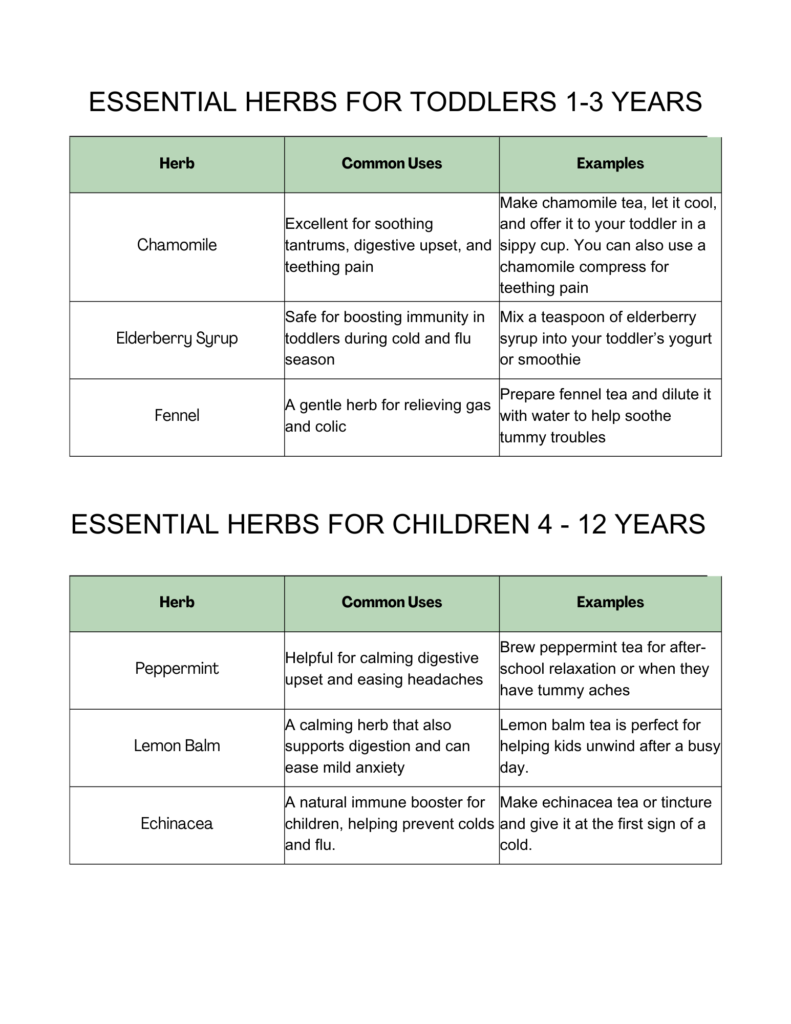
As children grow, you can expand the range of herbs you use, focusing on remedies that support their active lifestyles and growing bodies.
- Peppermint: Helpful for calming digestive upset and easing headaches.
Example: Brew peppermint tea for after-school relaxation or when they have tummy aches. - Lemon Balm: A calming herb that also supports digestion and can ease mild anxiety.
Example: Lemon balm tea is perfect for helping kids unwind after a busy day. - Echinacea: A natural immune booster for children, helping prevent colds and flu.
Example: Make echinacea tea or tincture and give it at the first sign of a cold.
Herbs for Teens
Teens face a range of physical and emotional changes, so herbs that support hormone balance, stress relief, and energy can be especially helpful.
- Ashwagandha: An adaptogen that helps the body adapt to stress and balance hormones.
Example: Create an ashwagandha-infused smoothie or tea to help teens manage school stress and anxiety. - Red Raspberry Leaf: Excellent for supporting hormone balance and easing menstrual cramps.
Example: Prepare red raspberry leaf tea for teens experiencing period discomfort. - Rosemary: Enhances focus and cognitive function, making it great for schoolwork.
Example: Brew rosemary tea to help improve concentration during study sessions.
Herbs for Adults
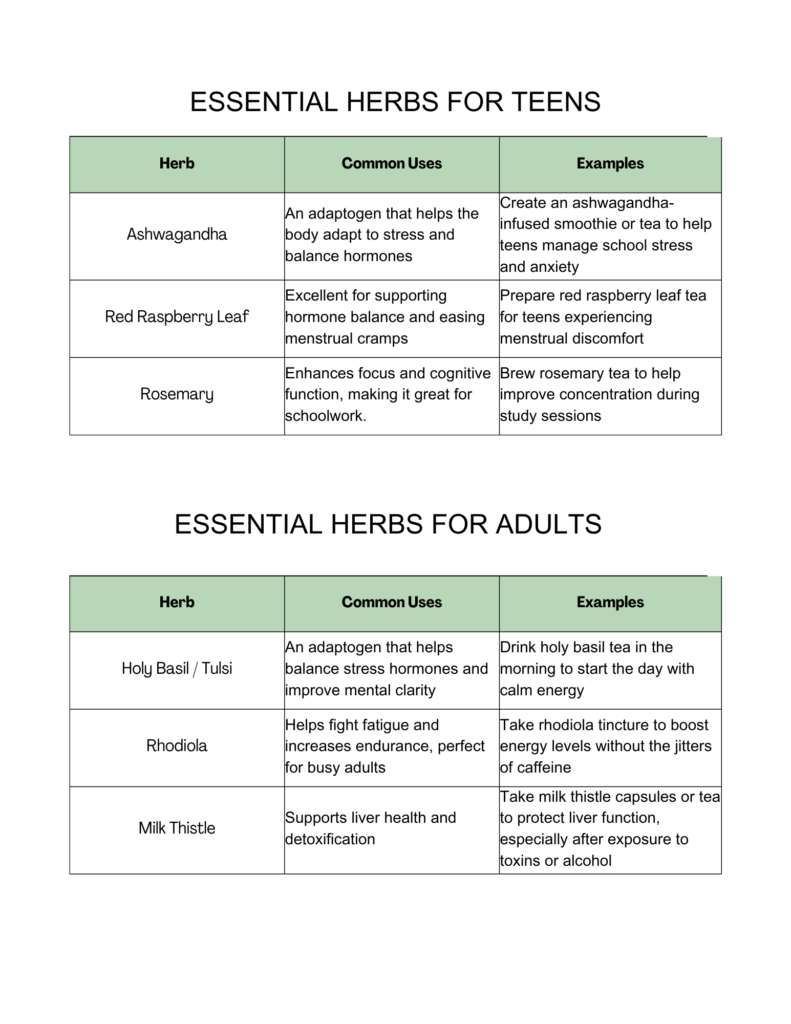
For adults, herbs can be used to manage stress, support energy, and boost overall health. Adaptogenic herbs, in particular, are great for helping manage the demands of everyday life.
- Holy Basil (Tulsi): An adaptogen that helps balance stress hormones and improve mental clarity.
Example: Drink holy basil tea in the morning to start the day with calm energy. - Rhodiola: Helps fight fatigue and increases endurance, perfect for busy adults.
Example: Take rhodiola tincture to boost energy levels without the jitters of caffeine. - Milk Thistle: Supports liver health and detoxification.
Example: Take milk thistle capsules or tea to protect liver function, especially after exposure to toxins or alcohol.
Herbs for Seniors
Seniors can benefit from herbs that promote cognitive health, boost energy, and support joint and heart health. Always consider any medications they may be taking to avoid potential interactions.
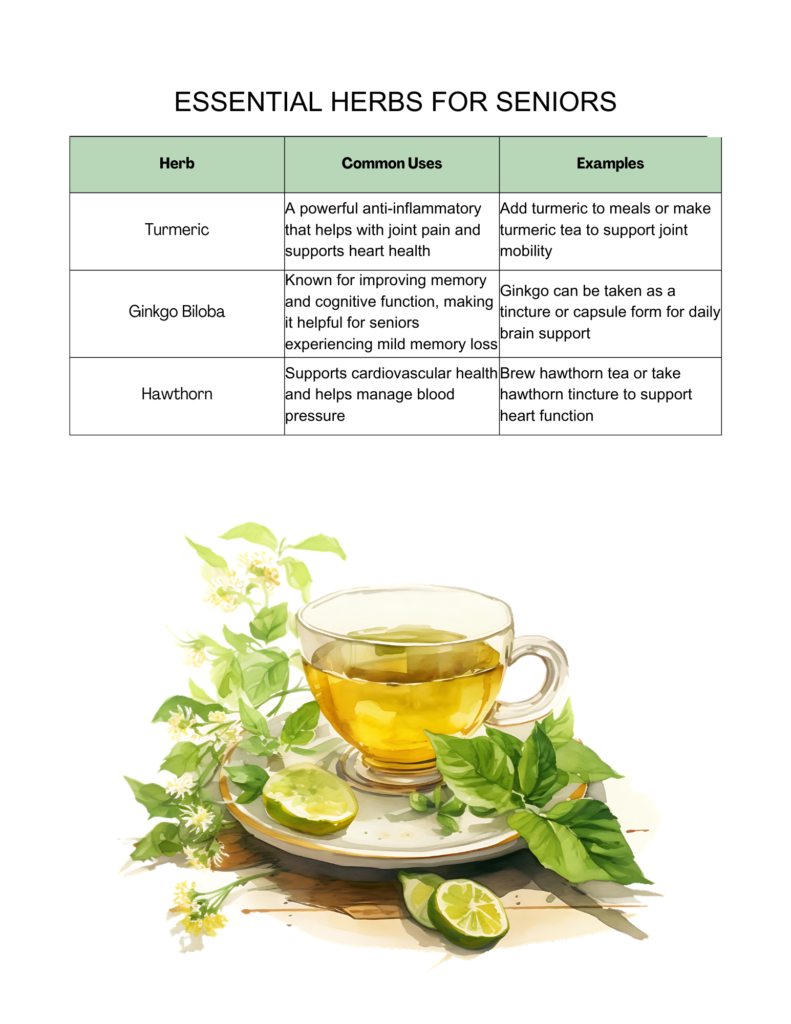
- Turmeric: A powerful anti-inflammatory that helps with joint pain and supports heart health.
Example: Add turmeric to meals or make turmeric tea to support joint mobility. - Ginkgo Biloba: Known for improving memory and cognitive function, making it helpful for seniors experiencing mild memory loss.
Example: Ginkgo can be taken as a tincture or in capsule form for daily brain support. - Hawthorn: Supports cardiovascular health and helps manage blood pressure.
Example: Brew hawthorn tea or take hawthorn tincture to support heart function.
Tips for Safe Herbal Use
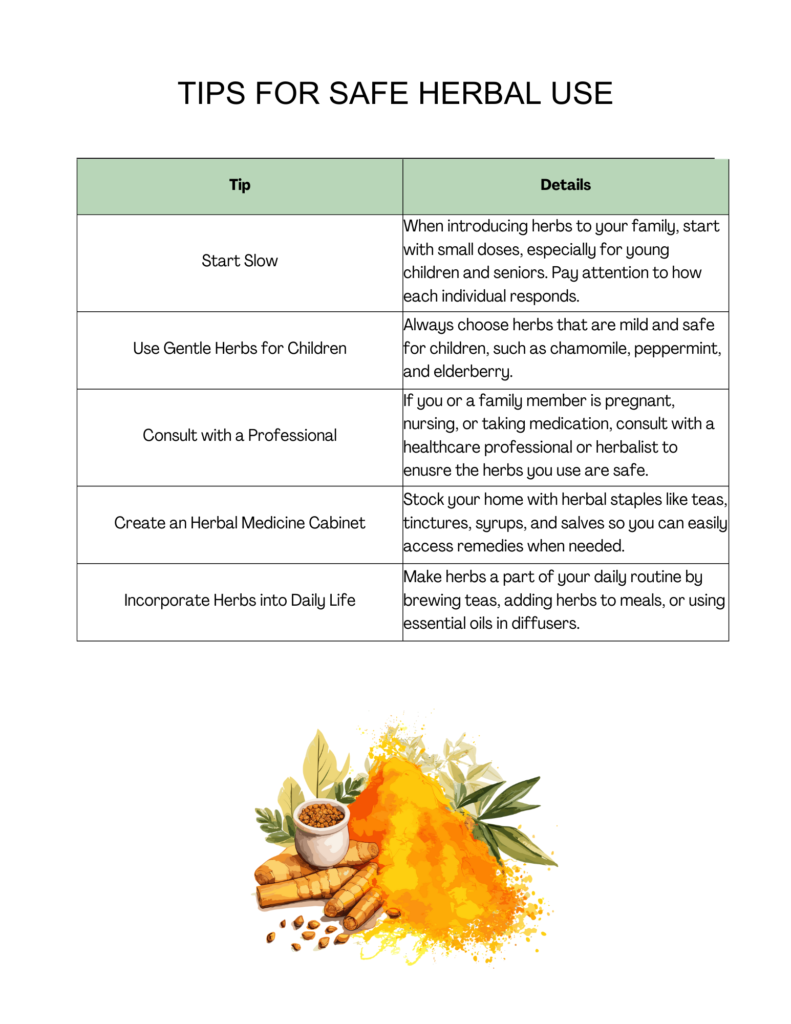
- Start Slow: When introducing herbs to your family, start with small doses, especially for young children and seniors. Pay attention to how each individual responds.
- Use Gentle Herbs for Children: Always choose herbs that are mild and safe for children, such as chamomile, peppermint, and elderberry. Avoid herbs that are too stimulating or strong.
- Consult with a Professional: If you or a family member is pregnant, nursing, or taking medication, consult with a healthcare professional or herbalist to ensure the herbs you use are safe.
- Create a Herbal Medicine Cabinet: Stock your home with herbal staples like teas, tinctures, syrups, and salves so you can easily access remedies when needed.
- Incorporate Herbs into Daily Life: Make herbs a part of your daily routine by brewing teas, adding herbs to meals, or using essential oils in diffusers.
Get your pdf download of the above charts
Remember, herbalism is a journey, and as a family herbalist, you’ll grow with your family’s needs, learning which herbs work best for each individual and how to tailor remedies accordingly. As you gain confidence in your herbal practice, you’ll find that herbs become a natural part of your family’s daily wellness routine, promoting health, balance, and well-being at every stage of life.
Continuing Your Herbal Learning Journey
Herbalism is a lifelong journey, and as you continue to learn, you’ll discover new ways to support your family’s health naturally. There are many ways to deepen your herbal knowledge, whether through books, workshops, online courses, or connecting with local herbalists.

You can and should check out my herbal study manuals, with accompanying workbooks. Or my Herbal Individualized Therapy Books:
How to Become An Herbalist manual, workbook
Herbs and Your Health manual, workbook
Herbal Properties and Nutrition manual, workbook
Herbal Nervine Therapy, Herbal Headache Therapy, Herbal Diabetes Therapy, Herbal Cancer Care Therapy
Here are some tips for continuing your learning:
- Join a Local Herbal Group or Online Community: Connect with other herbalists and families who use herbs. Sharing experiences and learning from others can help expand your herbal knowledge.
- Take an Herbal Course: Many online herbal courses offer beginner, intermediate, and advanced classes that cover a wide range of topics, from making herbal medicine to understanding plant properties.
- Keep a Family Herbal Journal: Document your family’s herbal journey. Record which herbs you’ve used, how they’ve helped, and any adjustments you’ve made. This journal will become a valuable resource for future reference.
- Teach Your Family About Herbal History and Culture: Herbs have been used for thousands of years across various cultures. Teaching your family about the historical and cultural significance of herbs can add depth to their understanding and appreciation of herbal medicine.
Embrace Herbal Wellness as a Lifestyle
Becoming a family herbalist is about more than just using herbs for health—it’s about embracing a lifestyle that’s connected to nature, wellness, and holistic living. By incorporating herbs into your family’s daily routine, you empower your loved ones with natural tools for health and healing, while fostering a deeper connection to the earth.
As you continue your herbal journey, remember that every step brings new learning opportunities. From brewing a cup of chamomile tea for your child to creating an herbal remedy for an aging parent, you’re building a foundation of wellness that can be passed down through generations.
Now that you have the tools and knowledge to start your journey as a family herbalist, it’s time to take the next step. Start small, explore the herbs that resonate with your family’s needs, and watch as herbal wellness becomes a natural, joyful part of your family’s life.
Are you ready to become your family’s herbalist? Start today by choosing one herb to incorporate into your routine and watch how it can transform your family’s health and well-being.
Suggested Reading and Resources:
- “The Herbal Medicine-Maker’s Handbook” by James Green
- “Herbal Healing for Children” by Demetria Clark
- Online herbal courses: Herbal Academy
- Herbal community groups: Join local herbal meetups or online herbal forums
💚 Why It Matters Herbalism is more than just natural medicine – it’s a way of life that strengthens families from the inside out. It reduces reliance on pharmaceuticals, encourages a holistic approach to health, and reconnects us with the natural world. Family Herbalists play an essential role in empowering families to take control of their health, promoting a foundation of wellness that can be passed down for generations.

